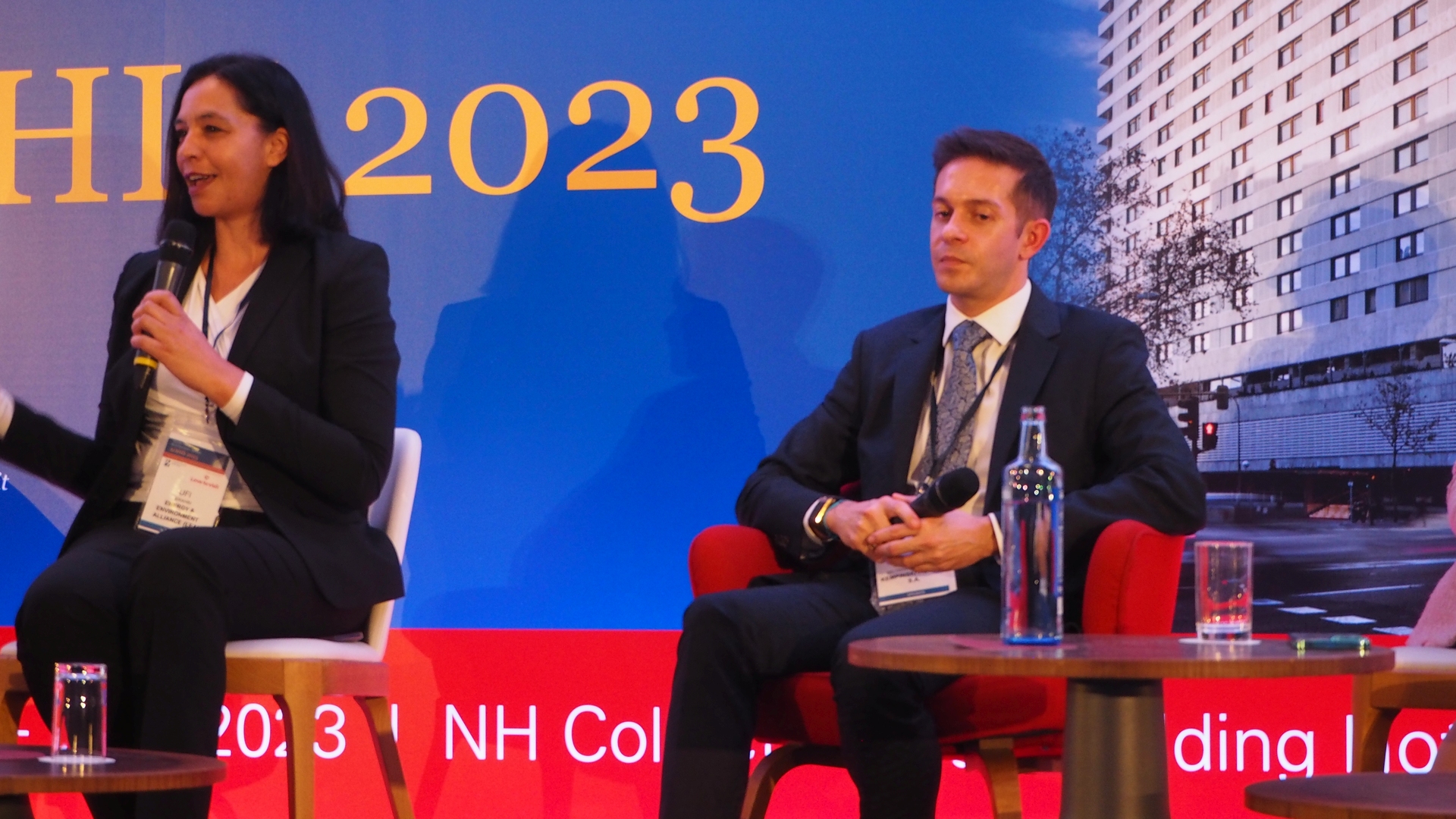AOHIS Madrid: A financial balancing act for everyone, ESG a real estate issue
 |
| Who has already hired an ESG manager? Just under a third of the approximately 250 participants in the hall raised their hands. / Photo: AOHIS |
Madrid (February 3, 2023). The next few years will not be kind to hotel investors, that much is clear. This was already apparent from the opening statements made by the experts in the first round of discussions at the AOHIS Investors Conference in Madrid in mid-January. Yet there's one thing that owners and investors fear more than increased energy and labour costs, more even than inflation and higher capital costs. And that's the ESG criteria. They are the elephant in the room.
Cost pressures weigh heavily on the entire industry, across the globe. Energy costs have risen faster than labour costs, plus owners and investors face the threat of mega-investments from ESG. How is inflation to be factored in in the first place? Certain is: There are more questions than solutions.
"We just have to have a lot of scenarios ready permanently," Kevin Colket, CEO of Global Hospitality Investment Group, advised his colleagues when discussing revenues and costs in times of inflation. The private equity firm (www.ghigroup.com) invests in hospitality assets in the U.S., Europe and Asia Pacific. Profit margins in Australia, for example, have been fantastic, but what good is that in a country where costs are among the highest in the world, the former Starwood Capital executive said, describing the paradox that strangles profit.
Ron Barrott, Chairman of Pro-Invest Group, another international asset manager (www.proinvestgroup.com), hit the brakes during the pandemic in his own projects (6,000 rooms). Costs simply had to come down, in IT as well and in terms of the number of employees. Today, he said, they work at a GOP level of between 45 and 50 percent. As everywhere else, sales and expenses have been and continue to shoot up, driven mainly by energy costs, which hit harder than labour costs.
 |
|
| Uniform ESG standards are now much closer, said Ufi Ibrahim (left); next to her fellow discussant Hadrian Beltrametti-Walker from Kempinski Hotels. / Photo: map |
Even more dramatic than that, and more dramatic than inflation, was the assessment of David Kellett, Managing Director of Hotel Transactions (hotel funds) at Invesco London (www.invesco.com), on the real estate side the issue of ESG: ESG will demand very very high levels of investment over the next 10-15 years - and much more on the real estate side than on the operational side, he added. "The yield requirements have increased... To justify these investments, you have to keep an eye on revenue and RevPAR. RevPAR must be significantly higher to justify such a means to an end."
ESG challenges real estate investments
The experts agreed that ESG will become increasingly important, but will not catch on until the measures become affordable, as with the Tesla engine: It must become cheaper for the e-car to be widely accepted. The industry needs to talk more with governments, Colket demanded - something moderator Russell Kett of HVS London coolly shrugged off: The hotel industry in Europe has never learned to work successfully with governments, he said. How true a statement that is. Kett then asked for a show of hands: Who has already hired an ESG manager? Just under a third of the 250 or so participants in the room raised their hands.
David Kellett noted that in the future, people will have to be much more selective in their choice of property, in part because the previous investment scalings no longer work. "But we don't have a hotel problem, we have a pure real estate problem," he clarified; that's something to talk about with governments. "You can now only invest in places where you can be sure you could generate increasing rents/leases to pay back the investment."
Legislatures set the pace
Sustainability and ESG were also permanent companions in the panels at the AOHIS premier in Madrid. But who is pushing ESG standards the hardest, moderator David Mallinson of British consultancy Withers wanted to know in a separate panel discussion. Ufi Ibrahim, founder and CEO of the Energy & Environment Alliance (www.eea.international), which aims to define international standards, measurement methods, green finance and legal issues, was positive: Uniform standards are now much closer, greenwashing now attracts legal sanctions [editor’s note: in the UK], governments have serious plans, and financial reports are changing due to new metrics...
Sensitivity is growing
When asked about the so far brittle cooperation between investors, owners and operators, she says bluntly: "The solution is simply: All sit down together and decide how you want to respond - or wait for regulations to do it for you!" She praised the German government for splitting responsibility for ESG equally between both sides. "Legislative initiatives are picking up speed," warned Ufi Ibrahim, "things are already moving at speed." In her opinion, the speed also comes from the domino effect that is beginning to come from large companies and their sustainability criteria for corporate travel (CO2 compensation), thus putting operators and ultimately investors/owners under pressure. Behind it are large industries with multi-million dollar budgets for hotel stays. In the future, anyone who cannot identify themselves as "green" will not be booked.
Sabine Schaffer, CEO Europe, Pro-Invest Group, confirmed from her experience in Asia that even there the sensitivity for ESG has noticeably increased in the last 18 months alone. "And we must also realise," the asset manager said self-critically, "that our portfolios also contain certain obsolete assets." In the end, access to credit will determine ESG commitments. She called on investors and owners to give the operator a share of the asset value. In the question-and-answer session at the end, one participant suggested just the opposite: The operator should create an incentive for the investor!
In any case, the ESG wave is rolling, but investors/owners and operators still have a long way to go to reach a common understanding of the concept and of how to deal with each other. ESG is the elephant in the room. It was surprising that quite a few of the distinguished participants at AOHIS seem to be just beginning to look more deeply into the subject. / Maria Pütz-Willems
Continuative Links:
To print this article you have to be registered and logged in for newsletter, visitor or subscription.





